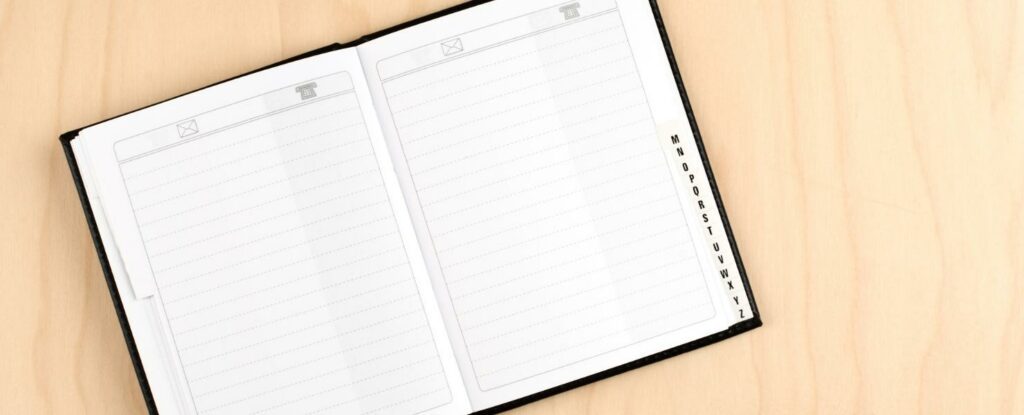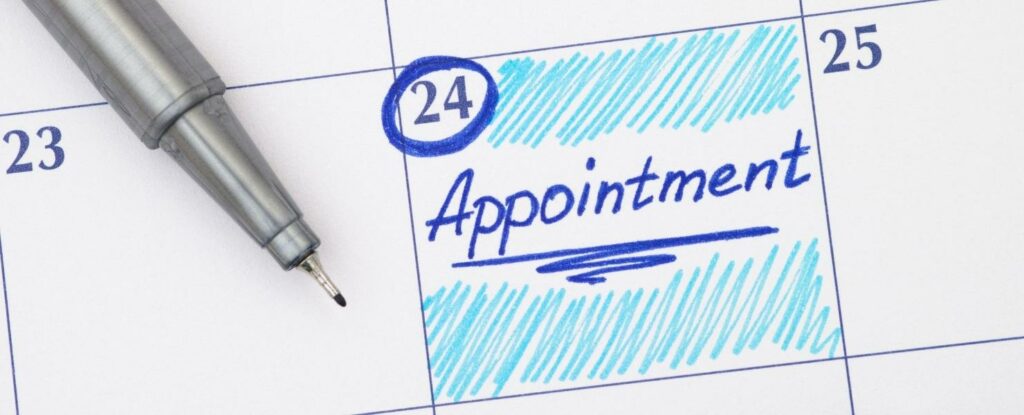Caring for a loved one as they age is an honor and privilege. But that doesn’t mean it can’t also be overwhelming and stressful.
A primary caregiver to an older adult is full of responsibilities and things to remember around the clock. Appointments, medications, and basic routines can be difficult to always keep track of.
Using tools to take some of the pressure off can help you remain less stressed and more confident, knowing that you’ve got everything covered.
A notebook full of lists, a handful of post-it notes on the fridge, or perhaps more tidy solution such as an app that brings it all together, like WayWiser, can help you do that. By having important information including things about health, finances, and contact information — you have all of the details you need in one place.
Today we’re covering six of the most helpful lists to get you started and what you should consider including in each of them.
1. Contact List

Many older adults have multiple healthcare providers and see many different professionals throughout the week, month, and year. Having a list of their doctors’ names and their clinic names as well as addresses and phone numbers can be helpful to have all together.
This list can include:
- Primary care provider (including nurse or assistant’s name)
- Any specialists
- Home health nurse or sitter
- Pharmacy
- Medical equipment supplier
- Physical therapist / Occupational therapist (know the difference?)
- Your information and the information of any other decision makers
You probably already have something like this scratched on a sheet of paper or perhaps have this information stored in your phone under each individual contact, making it a fairly easy list to create. But putting everything together in a specific list, including addresses, can make it easy for you or someone else to find a contact in a hurry.
Using an app like WayWiser also allows you to instantly share this list with others in your Trusted Circle after you’ve created it. So, if your sister or uncle need to take care of your mom while you’re out of town, they already have all of the contact information at their fingertips.
Don’t forget to include non-healthcare contacts. This could be the lawn maintenance person, a driving service, or a meal delivery company. Collecting everyone’s information that is involved in your loved one’s day to day can make sure updates are shared to prevent delays or errors.
2. Health History List

Keeping track of a person’s past medical history and their daily medication list is difficult to do, especially if it’s always changing.
This is why a list of important health information can be super helpful with things included like:
- Current list of medical issues or diagnoses (high blood pressure, diabetes, Parkinson’s Disease)
- Past medical issues including surgeries, procedures, events (heart attack, stroke)
- Recent hospitalizations
- List of current medications (including dosage and frequency)
- List of allergies
Aging Americans tend to take multiple medications per day and that number is increasing each year.
Knowing why they’re taking each medication is also important, especially if they have a few that are only ‘as needed’. These medications can include drugs to treat constipation, pain, or anxiety. If you and other people involved in the senior’s care don’t know what medications should be taken for a certain periodic issue — this can lead to confusion as well as over or under treatment.
Not every doctor’s office will have an up to date medication list so having a health history list on hand can help everyone feel confident that a prescription has fallen through the cracks.
A diagnosis list or past history list is important for the same reason — certain drugs can’t be taken by people with various conditions and diagnoses. By showing this list with the healthcare team, safer choices can be made when adjusting medications or plans.
As you are probably thinking already, this might actually be five different lists! Each of the above are incredibly important and nearly impossible to remember if not written down. Keep things as organized as possible by creating separate lists for different items if it’s getting too cumbersome on one document.
3. Appointment List

Along with a long list of medications and doctors, many seniors have several appointments each week or month. Keeping a list, or calendar, of all of the appointments in one place can help reduce the chance of missing important visits. Again, this is where WayWiser comes into play as the shared calendar makes it incredibly easy to keep everyone in line with what appointments are coming up.
Some appointments only happen once or twice a year, like going to the dentist or getting a mammogram. Other appointments happen more frequently — for example someone who takes Coumadin may need to go to their doctor every week.
Even if something happens on a routine basis, like dialysis three days a week, you still have to spend energy remembering these appointments.
By having them all in the same place, if the person you are caregiving for wants to make a hair appointment or lunch date, you can easily check the list or the calendar to make sure there isn’t anything coming up (without having to remember a thing).
4. Decision Making/Legal List

If you’re the primary caregiver and decision maker — this comes with a lot of pressure to get the decisions right. To help answer the bigger, having a conversation with the person you’re caring for can help alleviate some of that pressure.
This list may include things like a living will or power of attorney information. Living wills are basically a list of preferences your loved one has when it comes to decisions about their care.
End of life decisions are often covered in living wills, such as resuscitation status and preferences when it comes to life-preserving treatments.
This list does not replace living wills or advanced directives — but it can help you keep track of where they are. They may be stored in a filing cabinet in the home of your loved one or with a lawyer for example. Or if stored digitally, you can include a link to the place where it can be accessed.
Being able to track down these documents easily can save stress and time if your senior is experiencing an emergency and decisions need to be made quickly.
5. Finance List

In addition to decision making, having bank and other financial information together is helpful. Oftentimes the power of attorney also manages finances, so knowing what bank(s) your loved one uses can come in handy when it comes to paying various bills.
Regardless of who pays the bills, having them all in one place can ensure something doesn’t get missed.
Here are a few common bills to consider when making this list:
- Utilities (water, electric, garbage)
- Doctor and/or hospital bills
- Insurance
- Therapy bills (physical therapy, occupational, mental health, etc)
- Subscriptions (Netflix, cable, internet, meal service, laundry)
- Miscellaneous and occasional bills (things that aren’t routinely billed for)
Including due dates as well as how your loved one pays the bill (Do they send a paper check? Do they use an app or website to pay?) Streamline bill payment by keeping up to date with everything that needs to be done each month and ticking it off as you go.
On that same note, you should also note what bills are on auto-payment and which ones need to be paid manually each month.
6. Daily Activity List

This list can be set up more as a log, or something that helps you keep track of the day to day activities, or even emotions and health status, of your loved one.
Think about things that would be important to keep track of regarding the health and well-being of your loved one. If they struggle to lose weight or gain weight, having a food diary can help everyone see what sort of diet they follow day to day.
It can also include behavior or mood, if your loved one has mental health concerns or cognitive decline, be sure to track how they are feeling. Even a simple 🙂, 😐 or, 🙁 could tell a story with simplicity.
By keeping a log of activity or behaviors, you can better gauge subtle changes that may indicate a need for adjustment. This could mean increasing supervision, adjusting medications, or simply recognizing the things that bring your loved one joy.
For example, if you start to notice their mood and appetite improve on days you walk the dog together, you could try incorporating that activity every day, rather than once a week.
Activity logs are also helpful to have on hand when going to doctor’s appointments to review how a new medication is working and identify side effects. It’s hard to recall specific foods or behaviors for the last month while you’re sitting in a doctor’s office so having this list on hand will save you the stress.
Another way you can use an activity list is to record certain values like blood sugar or blood pressure readings. This can help their healthcare team get a bigger picture on how a new medication or intervention is working.
Keeping a medication record can be a valuable list as well. In addition to the list of current medications, this list starts over each day and records medications as they are taken.
This is extremely helpful if multiple people help care for your loved one. If a new person comes in, they can review the medication record to see which ones have already been taken and which ones will need to be taken in the future.
You can also keep track of the ‘as needed’ medications here. If someone is needing more or less pain medication or medication for their anxiety, this is important information for their healthcare team to know to adjust medications.
Don’t Become Overwhelmed With Lists

After reading this, you may feel even more overwhelmed than before when it comes to keeping track of everything.
While initially setting up these lists can take a little time and energy, once they are put together (other than the daily logs) they don’t need to be adjusted unless things change. You also don’t need to include everything we’ve covered today, these are just suggestions to help get you thinking about what lists would be useful for you and your loved one.
Lists can help take away some of the stress and mystery of caring for your mom or dad — so tailor them to work for you and watch the overwhelm disappear!







